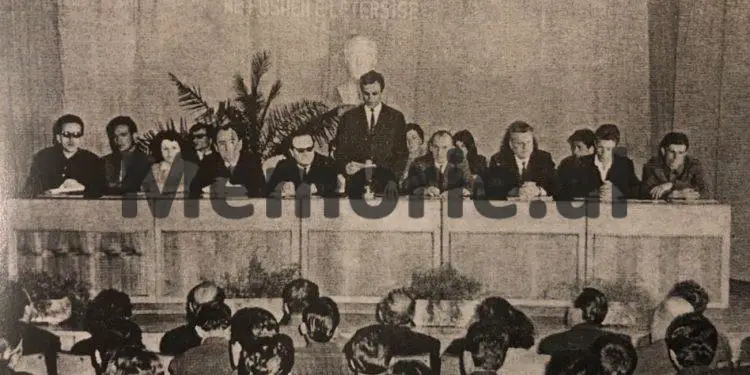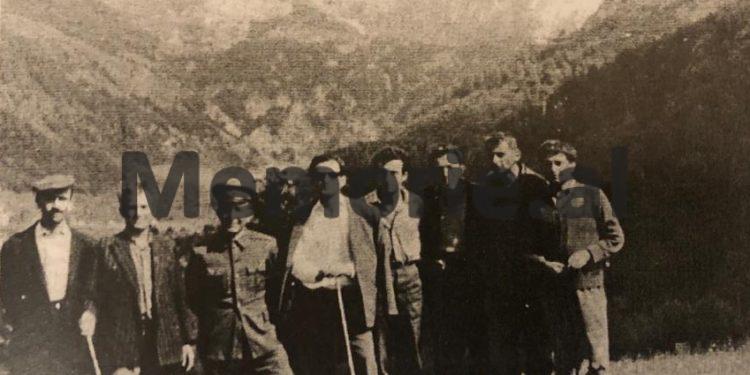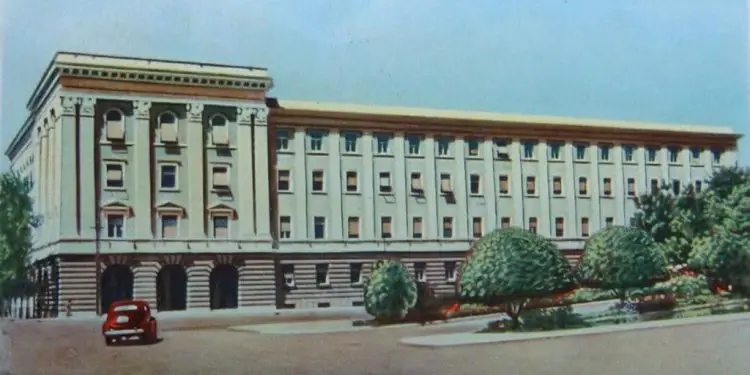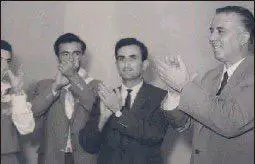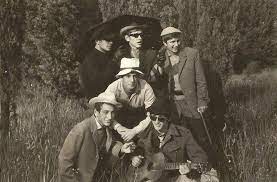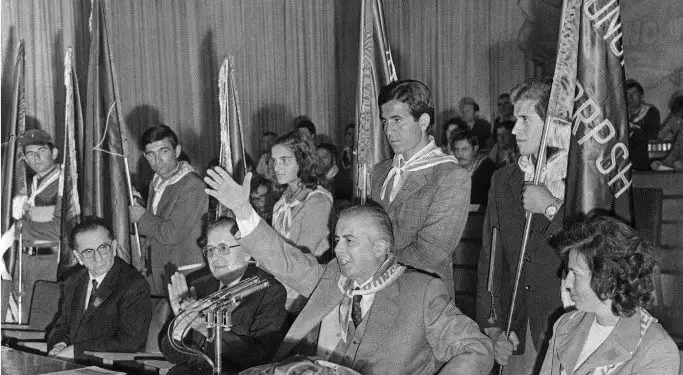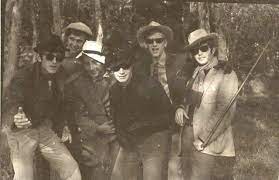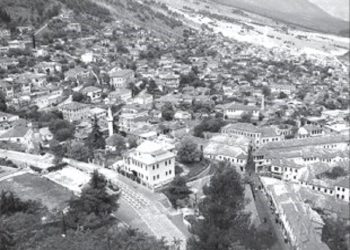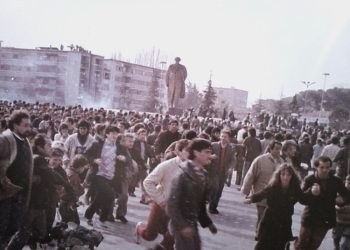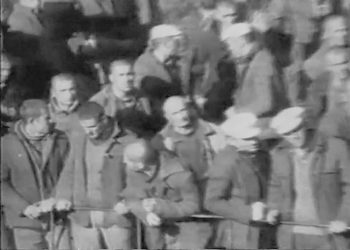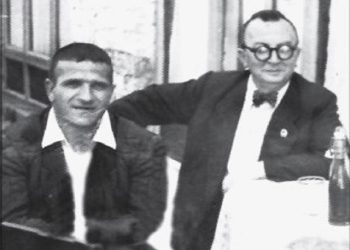Dashnor Kaloçi
Memorie.al publishes an archival document issued by the Central State Archive in Tirana (Fund of the former Central Committee of the ALP), where the discussion of Enver Hoxha held at the meeting of the Secretariat of the Central Committee of the ALP on February 23, 1973, where the main cadres of the highest forum of the organization of the Albanian Working Youth Union, chaired by Agim Mero, the first secretary of the Central Committee of the Albanian Working Youth Union, were also invited. that Enver ordered to be called urgently to that meeting. Enver Hoxha’s full speech at that meeting where he for the first time analyzed all the “problems of youth” and “its education”, with art, culture, literature, cinema, books, libraries, homes and culture, stocks, discounts, volunteer work, etc. As well as the problems that had emerged and appeared in some young people, with fashion, foreign shows, modernist influences, etc.
“I believe that there is no house of culture, where there are no different musical instruments, many of which are produced inside, are also brought from abroad, and that all together have helped a lot for the entertainment and education of the youth. In this area, there is a great development, a great progress has been made everywhere. The youth have these tools in their hands, which we see in Estrada and at festivals. This is a great pleasure, then why underestimate it? Needed even more, there is no doubt that yes, and efforts should be made for this, but to darken the issue and say that the shepherds who spend the summer in the mountains of Lenia and Gramoz do not have a radio or there is no film, that is to speak in the wind. Any shepherd can very well buy a battery-powered radio, if he wants, because there is a day in the market and his work is bigger than the others and not to be expected that the state will do everything. Friends of the youth, you are looking for many special clubs for the youth in the cities and this, wherever possible, let it be done, but as far as I know these are also built, equipped with everything, even with billiards, yes then they closed because they departed from the purpose for which they were raised. ”
This was stated, among others, by Enver Hoxha in his speech at the meeting of the secretariat of the Central Committee of the ALP on February 23, 1973, where the main cadres of the high forum of the organization of the Youth Labor Union were invited. Albania, which at that time was headed by Agim Mero. This meeting of the secretariat of the Central Committee of the ALP took place only shortly after the 11th Song Festival on Radio-Television and the speech of Enver Hoxha held on January 9 of that year in the office of the Presidium of the People’s Assembly of Albania, where he spoke for the first time against “liberal attitudes and foreign performances in art and culture” and their impact on the whole life of the country. For more about this, the document in question introduces us to the discussion of Enver Hoxha that Memorie.al publishes in full since this issue.
Discussion of Enver Hoxha in the meeting of the Secretariat of the Central Committee of the ALP, on February 23, 1973
You, friends of the youth, who we have called you here have something new to add to the report you have sent us? Yes Agim Meroja, is he here? To be called to come, because he also bears responsibility for the work of the youth. Can you tell us a little more specifically, mentioning the names of those who have negatively influenced, who has maintained a liberal attitude towards the Party directives on the issue of youth education, and which, in your opinion, has resulted in what some young people not to behave and not to live according to the norms of our proletarian morality, so they have fallen into liberalism? When we say, some young people, we do not mean all youth. There are some who say that “these shows are some characteristics of age”, “are periodic”, “that will disappear over time”, etc., etc. Which, stealing pockets, not attending classes properly, getting negative grades, barely passing class through schools, etc.
These are the characteristics of youth age?! Have the problems been treated ideologically well and have the sources and causes from which these liberal acts and attitudes are derived? The causes of these attitudes are copying and imitation from the outside world, distortion of the Party line, or what? Well, someone who stole something, was expelled from school or from a youth organization, but against some anti-Marxist philosophical thoughts and views, which are brought from abroad and which penetrate and are spoken in the university, not in the departments, but by some, in the corners, is there a war or not? If not, why not this war? Who are these people who are so good at defending decadent foreign theories and others, who pretend to learn Marxism-Leninism day and night, are not able to expose and throw these theories in the trash, along with people who preach to them openly or secretly? Are there people, for example, in youth organizations who advocate Picasso or other decadent painters? There is no. Are these issues recognized in the organization?
Is there a need to clarify them theoretically and to support the justice of the Marxist-Leninist views of the Party, or is it just said that such problems should be raised and in fact not raised at all? These problems should be clear, not told to us here in two words: “rise”, “rise a little or not rise at all”. These issues are said in meetings and written in newspapers, but are treated shallowly and in a general way and, as a result, some people come out who actually propagate and put into practice bourgeois theories in art, culture, etc. When discussions are organized, do the comrades of the Party or the youth, who have experience and political and ideological preparation, stand up to orient these discussions on the ideological values of cultural, artistic works, etc.? I am not talking here about grammatical errors or the construction of the work in the sense that this idea is expressed at the end and at the top, but to clarify the political side of the issue being addressed, saying: “Here the problem is not written correctly politically; this idea is ideologically distorted”, etc.
Have the Party and the youth used such forms of work? I do not understand why this brave youth lacks the courage to reject a work that is not worthwhile, of this or that writer, when this youth did not lack the courage to go to war and be killed with enemies. These foreign plays, which are talked about here, such as some theatrical pieces, music, some songs, etc., were not made by the factory workshop, but by others. In the opinion of the youth, were mistakes made intentionally or unintentionally in these literary and artistic creations? Some young people, as you say, did not have the political-ideological ability to catch them quickly and to oppose foreign performances at once. But when they have noticed them on any occasion, have they delved deeper to see if the ideas were expressed on purpose? Do you think that an effective resistance to these foreign appearances and influences should be organized in order for them to be thrown in the trash? After the friends answered the questions and discussed about the problems that were raised, Comrade Enver Hoxha continued: It seems to me that the problem is set crooked from the beginning. The Secretariat of the Central Committee of the Party, instead of being given, in the first place, a concrete overview, albeit brief but clear, of the political, ideological, moral and organizational problems of the youth, how the decisions of the The Congress, how these decisions are being implemented, etc., from the beginning to the end, here is passed to the requests to the organs of the Party, those state and cultural institutions.
I am not saying that no requests should be made, but these should not be one-sided, not only because of the fact that you are not talking to us about the youth organization, but also in the requests if it stays, there should be no bias here. It is permissible to ask, but, of course, it will be required of you as well. If you say so categorically the phrase “as if the concerns, demands, interests and problems of the youth are not understood” (which I find neither fair nor real), then the question arises: Do you appreciate it? towards the great interest shown by the Party and the government for the youth? Do you appreciate the great material tools that have been made available to youth education in all spheres? Do you value and use these properly? Do you assess these within the overall development of the country and the needs of this development? It seems to me that in order to answer all these questions, it must be reflected first and, if it is reflected, you cannot and should not come to that conclusion that you have come to.
In the report you have presented to us, I have encountered several times your use of the term “youth concerns”. I do not understand what concerns you are talking about? What are these worries that break the heart of our youth? If you use this term long enough to use it, you are wrong. If you think about it seriously, then let’s seriously discuss why it is important to clarify both you and us. I think our youth is the happiest and happiest in the world. Everything in our country is made and built for the youth, it lives in a socialist country free from every point of view and is educated in a healthy way, it lives in a democratic country, where it enjoys all rights, but of course it also has duties. Since the child was born in our country, she has her parents and relatives at work, the economic life of our families has improved a lot. In addition, for the state the state does its best (and has done little), it has set up nurseries, kindergartens, holiday homes, hospitals everywhere for them. Children in Albania today grow up well fed, dressed, run, put to school. Schools of all levels are open to all and free of charge. When children get sick, healing for everyone and for them is also free. The state grants scholarships to young people from many families who attend high school and university. When they go to work, they get good salaries, rents in our country are completely cheap, state social insurance is the same as in ours.
Millions and millions of copies of books have been published and continue to be published. In addition to the central press, the newspaper has almost everywhere, in every district, in cities, in villages there are houses of culture, in factories and factories there are libraries, etc. Theaters, cinemas, professional and amateur theaters have been set up in large numbers on all sides. Almost every city has a large stadium, if not two, not to mention thousands of smaller sports fields. The whole country is very picturesque, one of the most beautiful in the world, our young women can go and go anywhere. They learn, work, live, do tourism and there is no obstacle for them, because all our people, the Party and the government highly value our youth, which fully deserves it. Then the question arises: What worries bother our youth? No, friends of the youth, the reality is not as you say. That more needs to be done, that’s right. That there are some people who do not care or do not properly understand these issues is also true. There are then those whom you complain about in the report, but, on the other hand, you yourself should see better in the eyes of your shortcomings.
Let us take the issue of the cultural front in youth education. Even this problem you do not look very straightforward, you even narrow the angle of view of culture which is a wide field. You forget this breadth and reduce the cultural front for youth education, saying that “in a number of districts no theatrical premiere with youth problems is prepared”, that “no feature film has been made about youth”, “publications literary are few and of a low level”, “there are no scientific publications for the youth”. To pose the problem in this way means to pose it shallowly and why not say it more openly, fellow youth leaders, to create the impression that it is the fault of others and not you who make the report or that you are the main leaders of the youth organization. The cultural front for youth education does not lie in preparing one or two films, one or two premieres that have not been made. For these to be done (and it is right to be done not so much, but even more), we must all fight, not forgetting you either; but the issue of the cultural front does not lie only in what I said, why they are a very small part of the work of this large and complex front.
The great cultural front for our youth is go11a, where knowledge is acquired, where science, philosophy is taught, and when young men and women leave the school benches, they enter the labor benches called lathes, land, livestock, in the struggle for life. All this broad front of activity to produce material goods is at once a great cultural front. Both of these fronts are open on both sides of the fold for the youth, who participate actively first as students, later as educators and creators. Therefore, the youth organization should pay more attention to these two cultural fronts for educating the youth mass, because these are the main ones. We have great successes on these two fronts. Our youth, in general, learn, are educated and work well. But he can and should work and learn even better, why all the opportunities have been created for him. I say that she should work and learn better, because in these directions there seem to be many gaps of a subjective character, gaps that can not only be charged to young people, but also to teachers and pedagogues, communists and youth leaders, leaders of economic and state bodies.
Certainly these shortcomings are fought against and continuous improvements are made, but, without underestimating the responsibility of others, which the Party and the Government constantly advise and rebuke to be corrected, I want to emphasize that the youth organization itself, wherever it exists as an organization and its leadership from top to bottom, the great and decisive front of culture for youth education, as I mentioned above is not putting due importance and doing a formal, routine job, there are even cases where it does not do at all . Not once, but many times I have talked to high school students and students, even the best and very good ones, and I have noticed that they do not know the important social movements of historians of different epochs of history, that they have no thread of knowledge, at least from where they are, on some writers and philosophers who have made epochs in human thought.
Can such a thing be accepted as normal? Of course, the professors are to blame for this, but aren’t our students and students to blame? What is the youth organization doing that does not educate these young people to complement their culture, whether in school or out of school? It does not matter if a theatrical play or a movie was made or not, when a young person who has finished high school and high school not only does not take the trouble to read literary pieces, comedies or plays with world famous, but I do not even know who are some authors such as Shakespeare, Moliere and others like these? Young friends can say, “Look, we’re having a meeting.” Hold meetings, friends, but I am told that there are hundreds of students who receive grades of five and there are many who are excluded because they do not study, because they behave badly, etc. This, comrades, is worrying for the Party and the concern is well-founded. For deficiencies of this nature you should worry and not about the imaginary or sick anxieties of some young people. Why do a number of disliked attitudes and behaviors resemble our clean society? /Memorie.al




